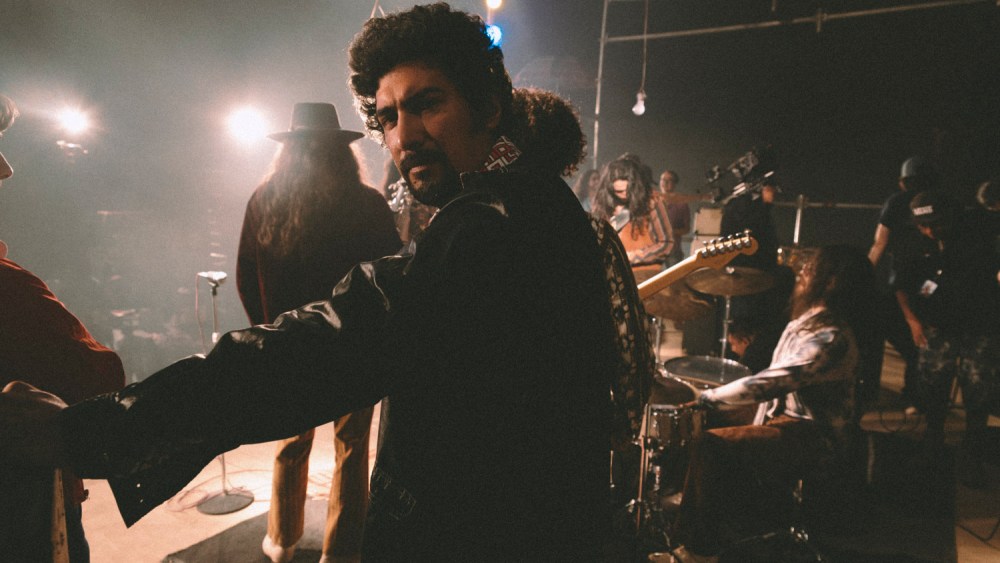Filmmaker JM Cravioto ( Bond for Vengeance, Diablo ) grew up hearing stories about the infamous Abandaro Festival, also known as the Mexican Woodstock. Held over a weekend in September 1971, the music festival was originally scheduled to feature 12 bands on the shores of Lake Avandaro, but ended up featuring 18 bands and hundreds of thousands more concertgoers than originally expected. The result was utter chaos, and the government required those who filmed it to remove all evidence of its existence.
Aiming to repackage the festival’s mythology for a new generation, Cravioto created “Wheels, Weed & Rock ‘n’ Roll: The Legend of Mexico’s Woodstock.” The mockumentary traces the creative process behind the festival and the madness of the event itself, drawing on the comedy of similarly toned works like “The Office” and “This is Spinal Tap” to reveal how what was supposed to be a car race with a few bands swelled into the “hell of naked depravity, blood, potheads, and death” celebrated by Mexican conservatives. The film will be shown in the Mezcal Mexico competition at this year’s Guadalajara Film Festival, and will also be shown in competition at the Huelva Ibero-American Film Festival.
“Now it’s easier to find information about stories like this, but we don’t hear about them as much anymore,” Cravioto told Variety. “That’s why I always try to make films that save Mexican stories. I also love rock ‘n’ roll and stories that involve youth and culture. I wanted to be part of this youthful spirit, this party energy, this anti-government Chicano rock movement, and tell stories that haven’t been told in this way before.”
Cravioto says the mockumentary format was born out of a lack of funding. When it became clear that the team did not have the necessary funds to film the original script in the way they had envisioned, producer Mariana Franco jokingly suggested they make a low-budget documentary instead. “That’s when I had the idea to do this as a mockumentary,” the director recalls. “We rewrote the script in a week, and it was the perfect solution to the lack of funds. The only luxury we had on this project was to shoot in 16mm, because we wanted the grain and texture of the time.”
The making of his 2019 animated feature Olympia, about three students caught up in the student movement at the National Autonomous University of Mexico in 1968, taught the director how to play with and manipulate images, which became a valuable resource that led to Wheels Weed and Rock and Roll. Cravioto extracted much of the events we see on screen from about an hour of 16mm footage salvaged from the festival, but only used green screens for a few sequences.
“The key piece of advice I can give when making a film like this is to have a lot of experience, not only from you as the director, but also from the team around you,” he adds, explaining how he was able to complete a film that looks like it was made on double the budget. “We’re a team of over 50 people, we’ve been working together for over 15 years, and now we might be one of the most experienced teams working on films in Mexico. We’ve shot big shows for Disney, Netflix and others. When we have money, we experiment, but sometimes we pick up the phone and tell people we don’t have money, but we have a great story to tell. And this is what happened here. We could only have achieved it because of our team.”
Cravioto said Mexico’s film industry more broadly is at a “moment of crisis.” The filmmaker said his colleagues were “captived” by the realization of the potential offered by the support provided by public funding bodies, which are only available to a fraction of the projects that are about to be produced in the country each year and “cover perhaps 30% of the requirements for film production.” Cravioto thanked the streamers, but said their money was spent on the promise of large audiences and financial returns, to the exclusion of real indie stories. “We’re in a situation where there are only 10 production companies available for work, and it’s very difficult to access, both financially and in terms of credibility for projects.”
The director said that phenomena like The Three Amigos (Guillermo del Toro, Alfonso Cuarón and Alejandro González Iñárritu) are “of an era” and the result of a generational trend in filmmaking that produced the likes of Christopher Nolan, Paul Thomas Anderson and Quentin Tarantino. “They are a great generation, but we shouldn’t hold them up as a success story[in Mexico]because their story is not the story of other people working today. Movies like ‘Frankenstein’ are only for Guillermo del Toro.”
With this in mind, the director directed “The Billionaire Bunker” and “Berlin” in Europe, strengthening ties with Spain. Following the success of the show, Cravioto is currently working on his first full-length production in Spain. Details are still being kept under wraps, but the film will be titled “The Kiss of the Vampire” and will be a drama inspired by a true Spanish story. The filmmakers have now locked down financing for the project.
“The last two screenings were in Spain, and I think it was a great opportunity for Mexican filmmakers to show that they are more than just a few films at big festivals,” Cravioto added. “There are so many stories, colors and textures in our films, but it’s sad that only a handful get into the big festivals. We need to show that there is hope that more spaces will open up in the future.”

